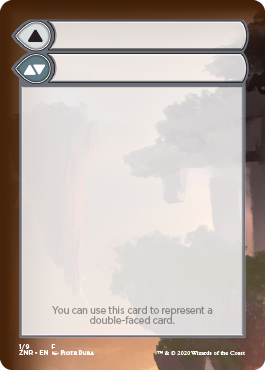Helper card

A helper card is an optional substitute for a double-faced card, introduced with Zendikar Rising.[1][2] On the front side you can write, the back side is a regular card back. It is an improved Checklist card.
Description
When playing with double-faced cards, either the traditional transforming ones or modal double-faced cards, it's important that your cards are indistinguishable from one another. To accomplish this, you can use either opaque sleeves, helper cards, or both.
To use a helper card, you must have the actual double-faced card in your possession. Write down the name of the card you're representing, along with any other information visible on the actual card. You can't use helper cards to jot down sideboarding notes, or anything not found on the card. During the game, if the card is in a public zone, swap in the real card. If it's in a hidden zone, use the helper card.
Rulings
- A helper card acts as a substitute for a double-faced card in hidden zones or wherever its identity is concealed (such as in exile if it's exiled face down). Using helper cards is optional, but in tournaments, players with double-faced cards must use either helper cards or opaque card sleeves (or both).
- You must have the actual double-faced card the helper card is representing with you. The double-faced card should be kept apart from the rest of the deck and your sideboard.
- A helper card can be included in a deck only when it's being used to represent a double-faced card.
- You must write clearly on the helper card to show which double-faced card it represents. The name of at least one face must be written on the helper card, and any other information visible on either face of the card may also be written. Information that isn't available on the card may not be written on a helper card.
- During the game, a helper card is considered to be the double-faced card it represents.
- If a helper card enters a public zone (the battlefield, the graveyard, the stack, or exile unless it's exiled face down), use the actual double-faced card and set the helper card aside. If the double-faced card is put into a hidden zone (your hand or library), use the helper card again.
- If a double-faced card is exiled face down or put onto the battlefield face down, keep its identity hidden by using the face-down helper card or opaque card sleeves (or both).
- Certain older sets include checklist cards to represent double-faced cards or meld cards from those sets. A Zendikar Rising helper card can be used to represent those double-faced cards. The same rules about what information may be written on helper cards apply.
References
- ↑ Matt Tabak (September 1, 2020). "Zendikar Rising Mechanics". magicthegathering.com. Wizards of the Coast.
- ↑ Eli Shiffrin (September 10, 2020). "Zendikar Rising Release Notes". magicthegathering.com. Wizards of the Coast.